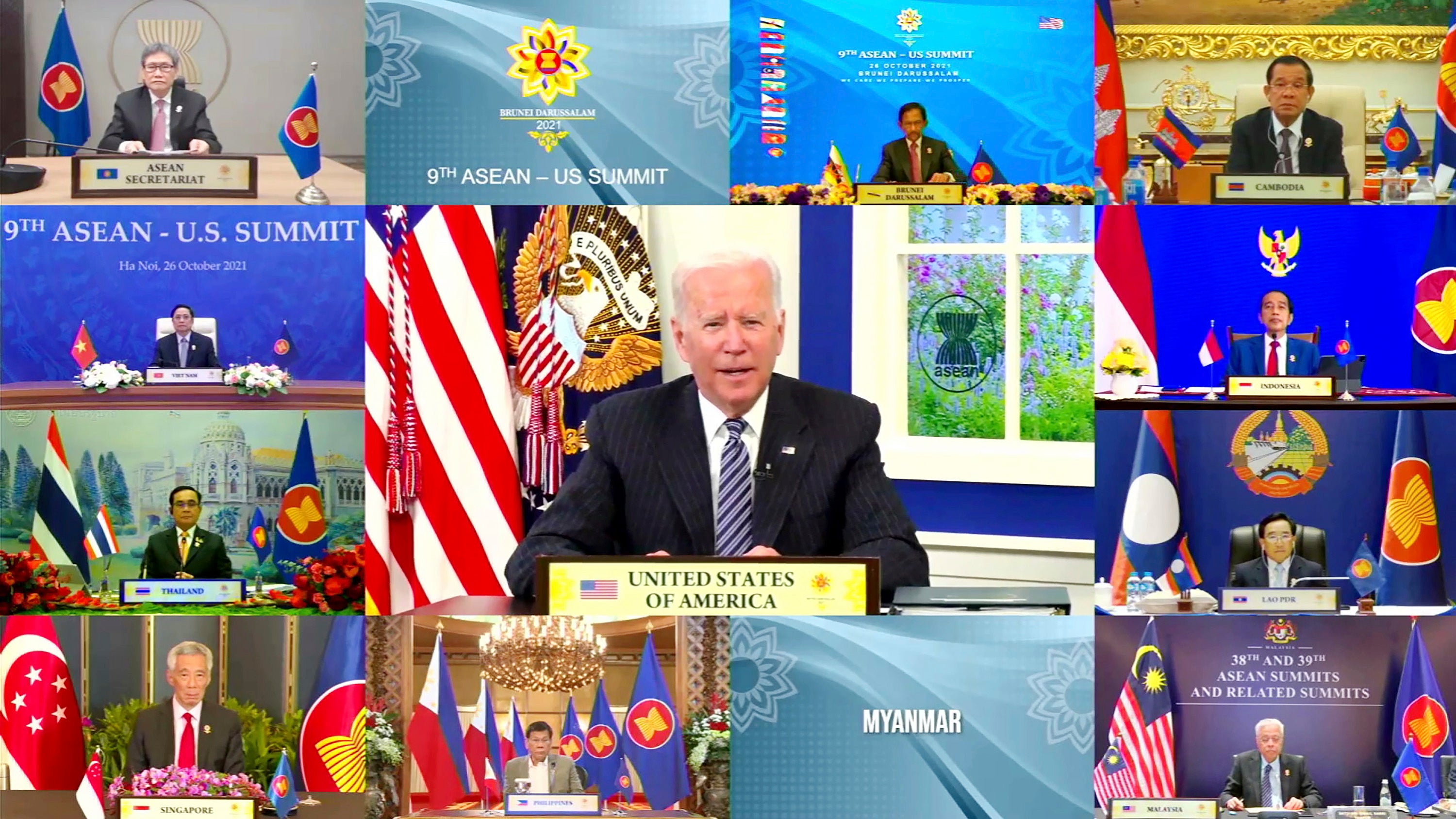US, China, Russia join Asia summit amid regional disputes
President Joe Biden and China’s Premier Li Keqiang will join an annual summit of 18 Asia-Pacific nations by video in a region where the world powers have dueled over trade, Taiwan, democracy, human rights and Beijing’s increasingly assertive actions in disputed territories

Your support helps us to tell the story
From reproductive rights to climate change to Big Tech, The Independent is on the ground when the story is developing. Whether it's investigating the financials of Elon Musk's pro-Trump PAC or producing our latest documentary, 'The A Word', which shines a light on the American women fighting for reproductive rights, we know how important it is to parse out the facts from the messaging.
At such a critical moment in US history, we need reporters on the ground. Your donation allows us to keep sending journalists to speak to both sides of the story.
The Independent is trusted by Americans across the entire political spectrum. And unlike many other quality news outlets, we choose not to lock Americans out of our reporting and analysis with paywalls. We believe quality journalism should be available to everyone, paid for by those who can afford it.
Your support makes all the difference.President Joe Biden and China’s Premier Li Keqiang will join an annual summit of 18 Asia-Pacific nations by video Wednesday in a region where the world powers have dueled over trade, Taiwan, democracy, human rights and Beijing’s increasingly assertive actions in disputed territories.
Russian President Vladimir Putin will also speak at the East Asia Summit, a wide-ranging forum on political, security and economic issues organized by the 10-member Association of Southeast Asian Nations.
The World Health Organization is expected to brief the leaders on the pandemic, which has set back the economies of the 18 countries representing more than half of the world’s population and accounting for over 60% of global GDP.
A White House statement Wednesday said Biden will reaffirm U.S. support for the ASEAN-led regional architecture and discuss his vision for working together with allies and partners to address issues facing the Indo-Pacific region. It was the first time since 2017 that a U.S. president is attending the summit, part of three-day high-level meetings hosted by Brunei, ASEAN's chair this year
During a separate meeting with ASEAN leaders Tuesday, Biden announced a $100 million initiative to beef up U.S. engagement with the region in the face of China s growth as a national security and economic adversary. Biden called the U.S. relationship with the bloc “essential.” The funding will cover health spending, a new climate initiative, education and programs to bolster economic recovery.
“I want you all to hear directly from me the importance the United States places on its relationship with ASEAN,” Biden said. “You can expect to see me showing up and reaching out to you.”
Relations between Washington and Beijing have plunged to new lows since nosediving under former President Donald Trump's administration, which adopted a confrontational approach on trade, visas, diplomatic representation and educational exchanges.
A long-simmering dispute over Taiwan flared up recently after Biden said the U.S. has a firm commitment to help the relf-ruled, which China claims as part of its territory, defend itself in the event of an attack.
The U.S. nuclear submarine deal with Australia and the U.K. has also angered China, which claims most of the disputed South China Sea and warned the pact would threaten regional stability.
The issue may be raised during a separate meeting Wednesday between Australia's leader and ASEAN. Some ASEAN nations such as Indonesia and Malaysia also fear the pact could escalate tensions in hot spots such as the South China Sea and spark an arms race.
The three-day ASEAN meetings have been clouded by a diplomatic standoff after military-ruled Myanmar skipped the summit in protest of ASEAN's move to bar Senior Gen. Min Aung Hlaing, whose forces seized power in February, from attending.
ASEAN's censure of Myanmar was its boldest after the bloc's envoy was prevented from meeting ousted leader Aung San Suu Kyi and other political detainees as part of a proposed dialogue to ease the crisis that has left more than 1,100 mostly anti-military protesters killed.
Myanmar has refused to send a junior representative to the summit and slammed ASEAN's move as going against the bloc's principles of non-interference in each other's affairs and decision-making by consensus.
Biden on Tuesday denounced the military in Myanmar for its use of “horrific violence” against protesters and pledged U.S. support for the nation's return to democracy.
In a chairman’s statement released after the summit Tuesday, the bloc’s leaders urged Myanmar to give its envoy, Brunei Second Foreign Minister Eryan Yusof, full access to all parties and release political detainees.
While respecting ASEAN's principle of non-interference, the bloc said it must also strike a balance in terms of rule of law, good governance, democracy and constitutional government in Myanmar's situation.
“We reiterated that Myanmar remains a member of the ASEAN family and recognized that Myanmar needs both time and political space to deal with its many and complex challenges," the group said.
____
Karmini reported from Jakarta, Indonesia. Associated Press journalists Jim Gomez in Manila, Philippines, Kiko Rosario and Grant Peck in Bangkok, contributed to this report.